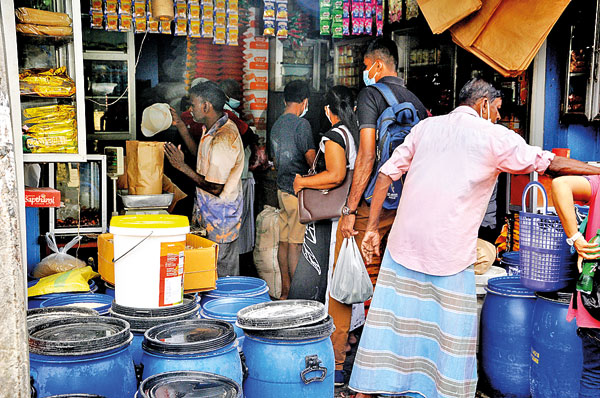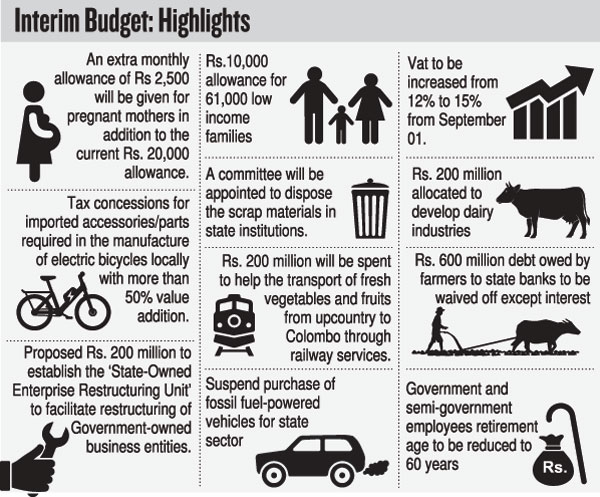News
Bouquets and brickbats for interim budget amid fears of soaring price hikes
View(s):
Parakrama Alles
By Senuka Jayakody and Sohan Vipulananda
The government’s interim budget has created more apprehension among the people already facing effects of the country’s worst economic crisis, of another wave of price increases, while it has also drawn criticism and praise from different sectors.
Raising the Value Added Tax from 12 to 15 percent would result in a hike in the cost of living and the relief measures introduced in Tuesday’s budget would not be enough to cushion the effect, said a cross-section of the people who spoke to the Sunday Times.
However, some defended the VAT increase, pointing out that it was the Gotabaya Rajapaksa government’s decision in 2019 to reduce the VAT from 12 to 8 percent that triggered the collapse of the economy.
Given below are some of the views expressed by those who spoke to us:
The provision of subsidies for kidney patients was received warmly by Colombo’s Chief Medical Officer Dr. Ruwan Wijemuni. He said the increase of the allowance by Rs. 2,500 would help poor patients, to some degree, to meet their medical expenses.

Wickramage Sujeewa
He also praised the addition of Rs. 2,500 to the Rs. 20,000 allowance given to pregnant women. This would help overcome anemia seen in 14 to 25 percent of pregnant women, especially those who go through hardships due to the economic crisis.
But, Midwife Association President Devika Kodithuwakku said a meagre increase in the allowance would not give pregnant women much relief, given the sharp price increases in food items.
The proposal to write off farmer loans was criticised by All Island Farmer’s Federation Secretary T.B. Sarath. He said most of those loans which did not even amount to 0.1 percent of the GDP, had already been paid.
In presenting the interim budget in his capacity as the Finance Minister, President Ranil Wickermesinghe said Rs 600 million would be allocated to pay off the loans of farmers.
Mr. Sarath gave a cautious welcome to the proposal to provide 20 hectares to unemployed youth. He said the move would help increase agriculture production, but expressed doubt regarding the output.
“These measures have been added only to beautify the budget, but very little is done in practice,” he said summing up his views on the budget.
The proposal to restructure the state banks drew harsh criticism from the Ceylon Bank Employer’s Union. Its President Channa Dissanayaka hit out at the move to allocate 20 percent shareholding in the state banks to the staff and the depositors. He accused the government of trying to sell the banks after contributing to their downfall by not repaying loans.
The VAT increase was met with strong criticism by many business people. A Colombo car salesman said that although the VAT was being increased from 12 to 15 percent, prices would increase by 8 percent, adding further burden to customers.

An already burdened people fear that interim budget will bring about more price increases on goods .Pix by Akila Jayawardana and Nilan Maligaspe
A spokesman for the Sri Lanka Institute of Packaging said the budget proposal to encourage food packaging using local materials would be impractical since it failed to address the fuel issue the industry was finding difficult to cope with.
He also said the 50 percent import duty concession for packaging machinery made no sense since it was already duty-free. Besides, the proposal also contradicted the Gazette issued on August 23, suspending printing industry imports.
Biodiversity Conservation and Research Circle Convener Supun Lahiru Prakash praised the proposals to minimise fossil fuel usage in the country, but said more needed to be done by way of restructuring public transport and similar measures to help the environmental cause.
Grama Niladhari Association President Saman Perera said the proposal to encourage the public sector to provide online services would be impractical since most government offices had no computer facilities.
Although the interim budget mentioned a relief programme for fishermen and the poorest segment of society with regard to the high kerosene price, the details were not spelt out. 
Jaffna District Fishermen Cooperative Association President Annalaingam Annarasa said he and his community had been calling for fuel subsidies for the past two months, but what they heard on Tuesday was only a promise in the budget speech.
He said fishermen might stop fishing activities next week because of the increase in the price of kerosene. “A fisherman needs about Rs. 10,000 to buy his weekly quota of 30 litres,” he said.
Athurugiriya resident Parakrama Alles, a driver by profession, expressed distress over the budget stating that the relief measures would not be enough to cope with the multiple effects of the economic crisis.
Locomotive Operating Engineers Union chief K.A.U. Konthasinghe praised the proposals related to the development of the Kelani Valley Railway, even though he saw the Rs. 200 million allocation as woefully inadequate.
He also welcomed the proposal to use trains to transport goods, especially vegetables and fruits, from Haliela to the Colombo Fort, but said the Railways did not have the right type of wagons to implement the project.
Dr. Renuka Priyantha, head of the Department of Public Policy at the University of Ruhuna, said he saw both pros and cons in the interim budget with regard to public sector reforms.
He praised the proposal to lower the retirement age to 60, saying it would pave the way for the youth to enter public administration, handle new technology more efficiently and gain experience.
Dr. Priyantha also admired the proposal for re-activating the Statement of Corporate Intent (SCI), a mechanism for enhancing the operational, financial and service delivery performances of State-Owned Enterprises (SOEs). However, he said only one entity should be set up to oversee public administration.
Commenting on the proposal to “rationalise the number of government employees,” he noted that Sri Lanka had no mechanism to analyse the country’s need of public employees.
Wickramage Sujeewa, who recently lost his job in a bakery due to the economic crisis, expressed a positive view of the budget, stating that the attempts to privatise the SOEs would in the long-run bring relief to the people.

The best way to say that you found the home of your dreams is by finding it on Hitad.lk. We have listings for apartments for sale or rent in Sri Lanka, no matter what locale you're looking for! Whether you live in Colombo, Galle, Kandy, Matara, Jaffna and more - we've got them all!

